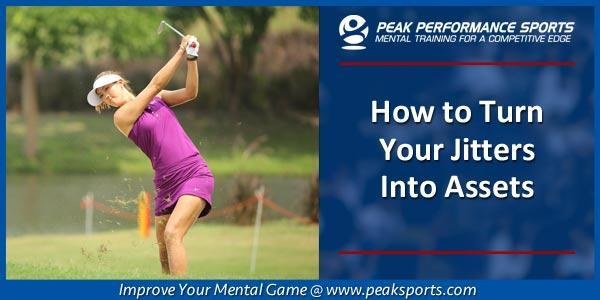
Are You A Jittery Golfer?
Preround jitters… Are they good or bad?
Preround jitters can create a tremendous amount of worry for golfers even before they tee it up.
For some jittery golfers, the feeling of nervousness builds until it seems impossible to focus on just golfing.
The reality is that preround jitters are not a bad thing and, are not only normal, but necessary for optimal play on the golf course.
Golfers experience preround jitters in three ways:
- Physical sensations (increased rate of breathing, faster heart rate, sweating, muscle tension, butterflies).
- Emotional feelings (excited, ready, pumped or fearful, apprehensive, overwhelmed).
- Thoughts (“I can’t wait to tee off” or “I’m going to play horribly today.”)
How can preround jitters enhance your golf?
Researcher Miguel Humara set out to investigate jitters in his study “The Relationship Between Anxiety and Performance: A Cognitive-Behavioral Perspective” (Athletic Insight, September, 1999).
Humara stated athletes that are successful interpret arousal to be facilitative.
In a study conducted by Jones, Hanton, & Swain found that elite swimmers who interpreted their anxiety as harmful experienced higher levels of intense anxiety intensity than those who reported it as being facilitative.
Interpreting your jitters as a sign of readiness will help you harness that energy and turn a potential detriment into a competitive advantage.
Think of jitters as that first cup of coffee or tea in the morning that gets you going and ready for the day.
How to play better golf and benefit from your jitters:
First, figure out how you experience jitters.
- When do they occur?
- What types of thoughts do you have when your jitters start?
- What level of jitters has helped your golf in the past?
- What level of severity interferes with your performance?
- Do you usually hit a good tee shot on the first tee regardless of jitters?
These are your “jitter triggers.” This will help you be aware of the level of jitters that are optimal for you.
Second, be proactive. Embrace your jitters before they get out of control. Learn how to stay in your optimal performance zone.
Figure out when and how to pump up or settle down. Direct your thoughts towards a positive interpretation of your jitters.
Try these tips to turn your jitters into an asset:
- Tip #1: You should write down specific actions on how you will respond to jitters in certain situations. Recall strategies that have been effective for you in previous tournaments.
- Tip #2: You should reflect on how your jitters have worked for you in the past. Reflect on these past successes when you begin to experience preround jitters. By keeping yourself in your optimal state for golf, you will feel a sense of control over your jitters instead of allowing your jitters to run wild during the first few shots.
Successful golfers have learned how to perform with ultimate confidence in competition. We’ve developed The Golfer’s Mental Edge Workbook Program to help you do this.
Related Sports Psychology Articles
- Sports Psychology Podcast: Dealing With Pre-Match Jitters
- Pre-Game Jitters: Perform Under Pressure
- How Stress Can Affect Sports Performance
*Subscribe to The Sports Psychology Podcast on iTunes
*Subscribe to The Sports Psychology Podcast on Spotify
Download a free sports psychology report to improve your mental game!
Learn more about our one-on-one mental game coaching.
Golfer’s Mental Edge

What’s the big sign that your mental game is the weak link in your golf game? When you can’t play consistently as well as when you play a practice or casual round–or your range game is way better than your game on the course. If you suffer from lack of focus, low self-confidence, poor composure or other mental game obstacles on the course, you can’t reach your true potential in golf.
The Golfer’s Mental Edge 2.0 Audio and Workbook program is ideal for any amateur, collegiate, junior, and tour professional golfer.
Golf coaches and instructors would also be wise to teach “The Golfer’s Mental Edge 2.0” principles to their players. This program is perfect for any golfer who wants to improve performance and consistency by managing their mind better on the course.

